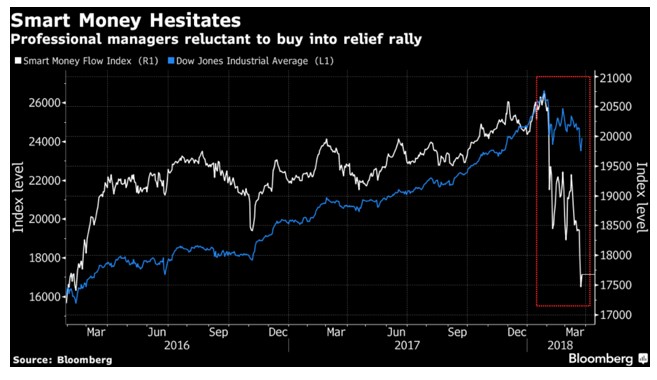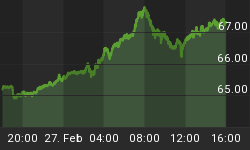More than one-quarter of all trading activity occurs a half an hour before the market closes, and lately ‘smart money’ is selling off—and the bulls should be concerned.
According to Credit Suissse, last year, more than 8 percent of S&P 500 stock trades—that’s $10 billion in trades--happened right before the bell.
That’s great if you can catch the pattern.
‘Smart money’ means big money--private equity groups, hedge funds, and institutional investors. If you watch what these players are doing an hour before the bell, you can look for bargains after they start selling-off, hold overnight and then dump after it (hopefully) regains the next day, before another sell-off closer to the bell.
It’s the Smart Money Index, and what’s happening now, according to Jack Albin, chief investment officer at Cresset Wealth, is that the ‘smart money’ is hitting a new low at the end of the day, and that could indicate that the correction isn’t over.
With this index now down more than 18 percent since its January record high, the problem is that the S&P 500 is only down 5.5 percent since its January high. What this means it that the S&P 500 needs to play catch-up with the Smart Money Flow Index, and that’s bad for the bulls.
A similar thing happened during the financial crisis.
Related: Silicon Valley’s Billion Dollar IPOs
"The Smart Money Index turned downward as early as June 2008, long before the September market swoon, and bottomed in October of that year, five months before the S&P rebounded,” Albin told CNBC.
Smart money has indeed been hesitating.

(Click to enlarge)
The rebound after a correction in the last week of March is a case in point. On Monday, March 26, Bloomberg noted that “professional money managers were “leery about buying stocks during the rebound.
That’s why the bears aren’t giving up any of their bearishness. They see what this index is doing and predict another retest. That same Monday proved them right: The Smart Money Index only gained 1.2 percent, while the Dow gained 2.8 percent, keeping the two out of step and indicating that the gap would have to be closed.
So is this definitive proof that the market is still in correction mode? Not necessarily: It’s just one indicator of many. Albin describes the Smart Money Flow Index as one “spice” in a whole list of “ingredients”.
By Fred Dunkley for Safehaven.com
More Top Reads From Safehaven.com:
















